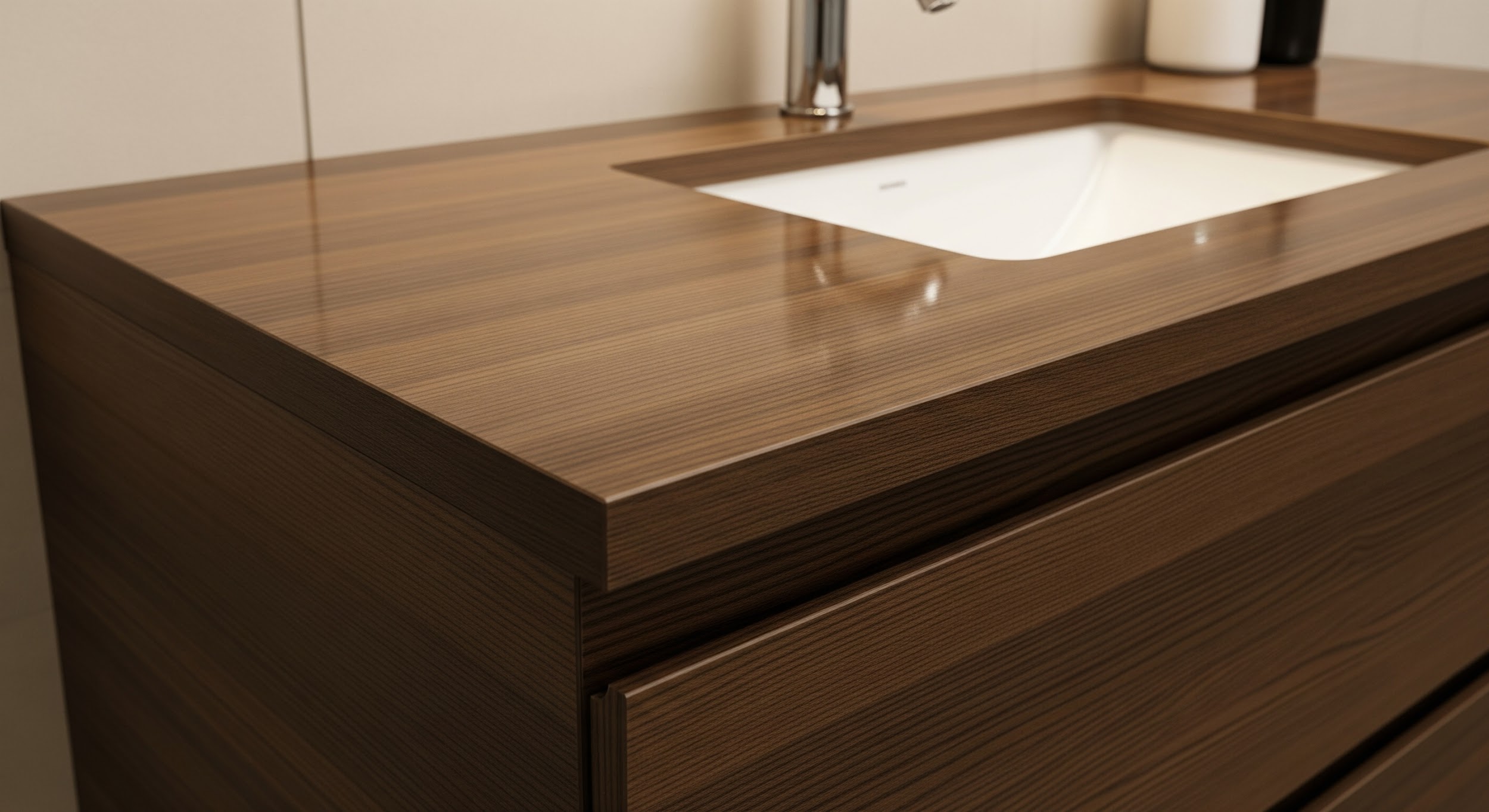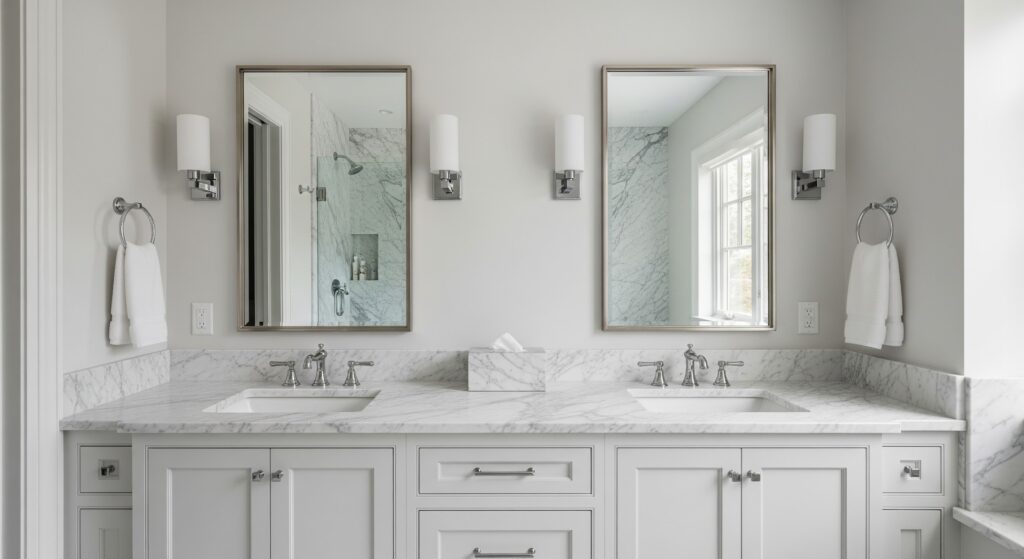Selecting the right bathroom countertop material comes down to how well it handles moisture, daily use, and long-term upkeep. In a space where humidity, water exposure, and cleaning products are routine, materials that can withstand wear without constant maintenance are essential.
Recent bathroom trends show renewed interest in natural finishes and textures. Homeowners have been observed to favor bathroom designs that use stone and wood surfaces to create warmth and contrast, particularly in vanities and countertop choices. These shifts highlight the importance of not just selecting what looks good, but also what performs well over time.
In this guide, we’ll outline some of the best bathroom countertop materials, with practical pros and cons to help you narrow down the right fit.
Laminate

Laminate countertops remain a popular choice for bathroom renovations due to their affordability and versatility. Constructed by bonding a decorative plastic layer to a particleboard or MDF core, modern laminates offer a wide array of designs that can mimic the appearance of more expensive materials like granite or wood. This makes them an attractive option for homeowners seeking a stylish look without a hefty price tag.
In bathroom settings, laminate surfaces are appreciated for their resistance to stains and ease of maintenance. They can be cleaned effortlessly with just water and mild detergent, making them a practical choice for spaces that require frequent cleaning. However, it’s important to note that laminate is susceptible to damage from heat and sharp objects. Placing hot tools directly on the surface or cutting without a board can lead to burns and scratches. Additionally, while laminate is water-resistant, prolonged exposure to moisture can cause the material to warp or delaminate over time.
Pros:
- Budget-friendly
- Wide variety of colors and patterns
- Easy to clean and maintain
- DIY-friendly installation
Cons:
- Prone to scratches and burns
- Susceptible to moisture damage over time
- Cannot be refinished or repaired easily
- Lower resale value compared to stone
Solid Surface (e.g., Corian)
Solid surface countertops, such as Corian, are composed of a blend of acrylic polymers and natural minerals, resulting in a non-porous, seamless surface. This composition makes them resistant to stains and bacteria, and any scratches or minor damages can often be repaired by sanding and polishing. These features make solid surface countertops a practical choice for bathrooms where hygiene and ease of maintenance are priorities.
However, solid surface materials are less resistant to heat compared to natural stone options. Placing hot objects directly on the surface can cause damage, so the use of trivets or heat pads is recommended. Additionally, while they are more durable than laminate, they can still be scratched by sharp objects, necessitating the use of cutting boards.
Pros:
- Seamless appearance
- Repairable surface
- A variety of colors and patterns
- Non-porous and hygienic
Cons:
- Can be damaged by heat
- Less resistant to scratches than stone
- Requires professional installation
- Lower resale value than natural stone
Granite
Granite is a natural stone composed primarily of quartz and feldspar, giving it outstanding hardness and resistance to high heat. In bathroom settings, it holds up well when sealed properly, but where it really shines is in kitchens, where exposure to hot pans, oils, and heavy use is more frequent. Its ability to handle high temperatures without discoloration makes it a go-to for kitchen remodels.
Granite is still widely used in bathrooms, especially by homeowners who want the look and feel of natural stone. While it requires some maintenance, it remains one of the most durable and long-lasting countertop options available. Its irregular patterns and mineral variation offer visual texture that can’t be replicated by engineered materials.
Pros:
- Strong resistance to heat and surface wear
- Holds up well under daily moisture and product use
- Available in a wide range of mineral-based colors
- Supported by long-standing demand in remodeling markets
Cons:
- Requires sealing to maintain stain resistance
- Can chip along edges without proper support
- Higher installation and material costs
- Must be installed by experienced professionals
Quartz
Quartz is currently one of the most popular countertop materials used in home remodeling, with granite coming in a close second. Both are widely used, but quartz tends to be favored in bathrooms because of how well it handles moisture, daily cleaning, and cosmetic spills. Its non-porous surface resists water, stains, and bacteria without needing to be sealed, which makes it especially well-suited for high-use vanities and shared bathrooms.
This shift toward low-maintenance materials is something remodeling professionals are seeing on the ground. Kurt, owner of Kitchen & More, notes that quartz has become one of the most commonly requested surfaces for Bellevue bathroom projects, especially among clients who want a bathroom that’s both easy to maintain and looks good.
This local trend aligns with broader industry data, indicating that quartz is the fastest-growing countertop material in North America, driven largely by its practicality in bathroom and kitchen remodels across residential markets.
Granite still holds an advantage in terms of heat resistance, which makes it better suited for kitchens. But in bathrooms, where water exposure and low upkeep are bigger priorities, quartz often proves the more reliable choice.
Pros:
- Non-porous and stain-resistant
- No sealing required
- Low maintenance
- Consistent in color and pattern
Cons:
- Less heat-resistant than stone
- Higher price point than laminate or solid surface
- Not for outdoor use
- Requires professional installation
Marble
Marble countertops are known for their unique veining. Each slab presents distinct patterns, making every installation one-of-a-kind. Beyond aesthetics, marble’s naturally cool surface is appreciated for its heat resistance, allowing hot styling tools to rest briefly without causing damage.
However, marble’s porous nature makes it susceptible to staining and etching from acidic substances, including common bathroom products. Regular sealing, typically every 6 to 12 months, is essential to protect against moisture and stains. Additionally, marble is softer than other stones, making it prone to scratches and chips, especially in high-traffic areas. Therefore, marble is best suited for low-use bathrooms or powder rooms where its defining features can be maintained with minimal wear.
Pros:
- Luxurious appearance
- Unique veining
- Naturally cool surface
- Heat-resistant
Cons:
- Porous and prone to staining
- Requires regular sealing
- Susceptible to scratches and etching
- Not ideal for high-traffic areas
Concrete
Concrete countertops are custom-poured surfaces that offer a distinctive, industrial-inspired look. Often chosen for modern or eclectic bathroom designs, concrete can be tinted, textured, or embedded with materials like glass, stone, or metal to create one-of-a-kind finishes. Its versatility appeals to homeowners looking for a bold design element that doesn’t follow conventional material patterns.
Despite its strength, concrete is naturally porous and must be sealed regularly to prevent water absorption, staining, and hairline cracks. It also requires careful installation and curing to avoid warping or uneven surfaces.
Pros:
- Fully customizable surface
- Strong visual presence
- Heat-resistant
- Can be cast in any shape or size
Cons:
- Needs regular sealing
- Prone to staining and cracking without maintenance
- Heavy and requires reinforced support
- Expensive due to custom fabrication
Tile
Tile countertops are composed of individual ceramic or porcelain tiles laid over a backing surface, offering a budget-friendly way to add color and texture to a bathroom. They come in a wide range of styles, including options that mimic stone or wood, and are often chosen for DIY-friendly remodels or vintage-style spaces.
While tile itself is durable and resistant to moisture, the grout lines between tiles are more vulnerable. Grout can stain, crack, or harbor mold over time if not sealed and maintained regularly. For this reason, tile countertops are typically better suited for guest bathrooms or powder rooms with lighter use.
Pros:
- Affordable and widely available
- Easy to customize with different tile styles
- Can be a DIY-friendly option
- Heat- and moisture-resistant tiles
Cons:
- Grout is prone to staining and mold
- Surface is uneven and harder to clean
- Can chip or crack with impact
- Requires sealing and ongoing grout care
Find the Best Fit for Your Bathroom
The best material for your bathroom countertop depends on your priorities, whether it’s low maintenance, bold design, or natural texture. Quartz stands out as a top choice for its moisture resistance and ease of care, especially in high-use spaces.
Granite remains a strong contender, particularly where durability and natural stone appeal are valued. Options like marble, concrete, tile, solid surface, and laminate each offer unique advantages depending on your budget and design goals.
Before committing, weigh the long-term upkeep, installation requirements, and how each material holds up in a humid bathroom environment. If you’re still unsure, consult with local experts or visit showrooms to see real-life applications up close.

